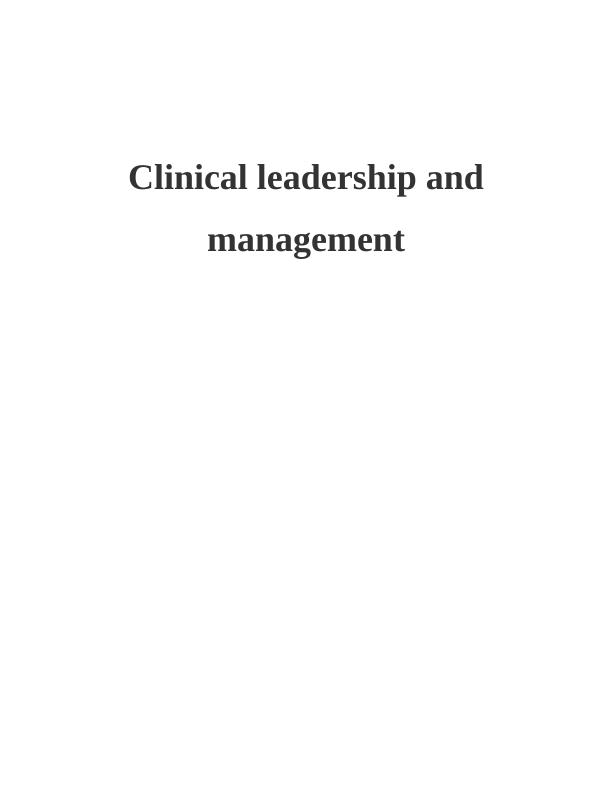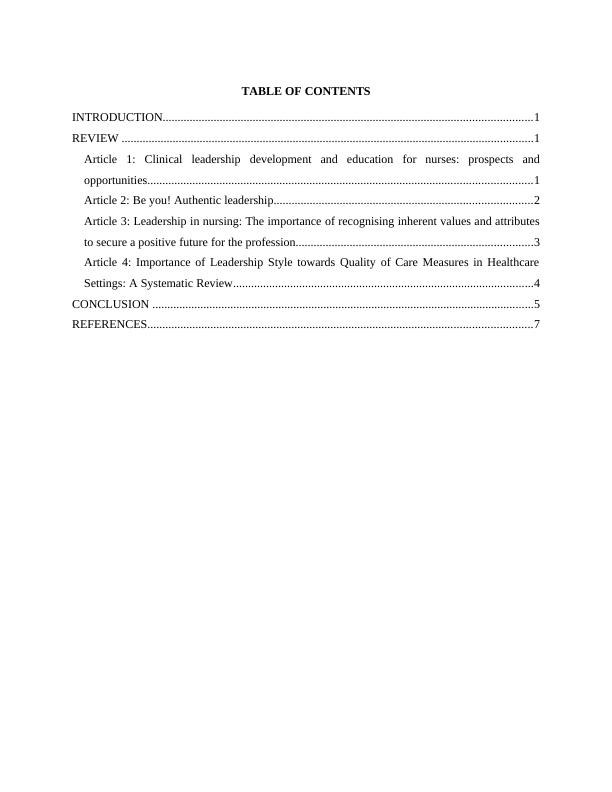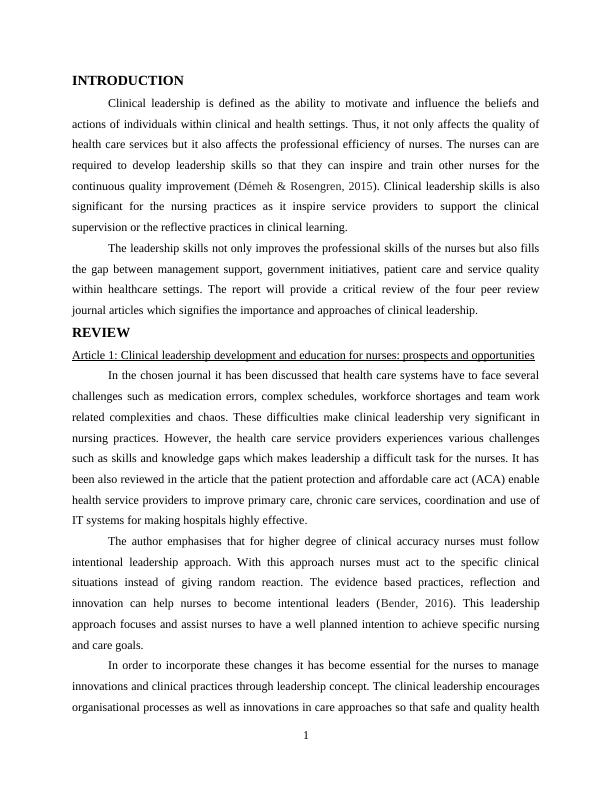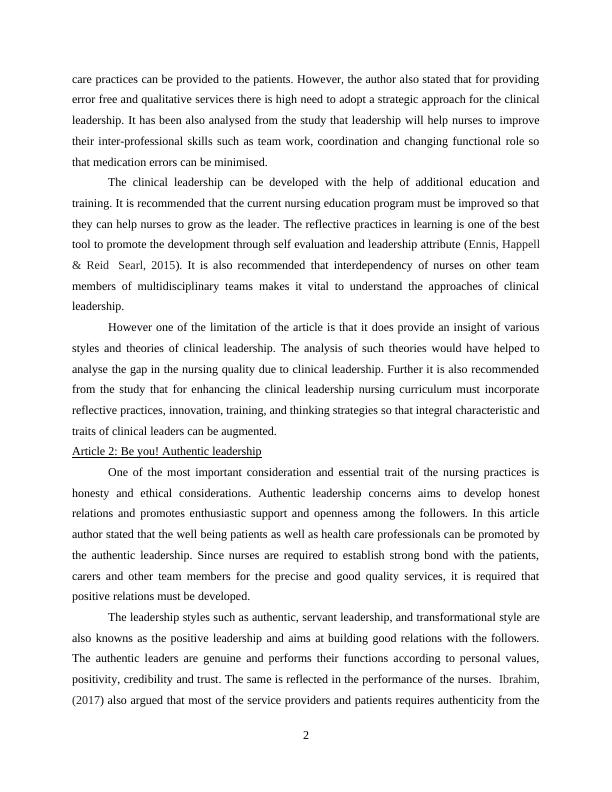Clinical Leadership and Management: Assignment
Added on 2021-02-19
14 Pages2681 Words183 Views
Clinical leadership andmanagement

TABLE OF CONTENTSINTRODUCTION...........................................................................................................................1REVIEW .........................................................................................................................................1Article 1: Clinical leadership development and education for nurses: prospects andopportunities................................................................................................................................1Article 2: Be you! Authentic leadership......................................................................................2Article 3: Leadership in nursing: The importance of recognising inherent values and attributesto secure a positive future for the profession...............................................................................3Article 4: Importance of Leadership Style towards Quality of Care Measures in HealthcareSettings: A Systematic Review....................................................................................................4CONCLUSION ...............................................................................................................................5REFERENCES................................................................................................................................7

INTRODUCTIONClinical leadership is defined as the ability to motivate and influence the beliefs andactions of individuals within clinical and health settings. Thus, it not only affects the quality ofhealth care services but it also affects the professional efficiency of nurses. The nurses can arerequired to develop leadership skills so that they can inspire and train other nurses for thecontinuous quality improvement (Démeh & Rosengren, 2015). Clinical leadership skills is alsosignificant for the nursing practices as it inspire service providers to support the clinicalsupervision or the reflective practices in clinical learning. The leadership skills not only improves the professional skills of the nurses but also fillsthe gap between management support, government initiatives, patient care and service qualitywithin healthcare settings. The report will provide a critical review of the four peer reviewjournal articles which signifies the importance and approaches of clinical leadership. REVIEW Article 1: Clinical leadership development and education for nurses: prospects and opportunitiesIn the chosen journal it has been discussed that health care systems have to face severalchallenges such as medication errors, complex schedules, workforce shortages and team workrelated complexities and chaos. These difficulties make clinical leadership very significant innursing practices. However, the health care service providers experiences various challengessuch as skills and knowledge gaps which makes leadership a difficult task for the nurses. It hasbeen also reviewed in the article that the patient protection and affordable care act (ACA) enablehealth service providers to improve primary care, chronic care services, coordination and use ofIT systems for making hospitals highly effective. The author emphasises that for higher degree of clinical accuracy nurses must followintentional leadership approach. With this approach nurses must act to the specific clinicalsituations instead of giving random reaction. The evidence based practices, reflection andinnovation can help nurses to become intentional leaders (Bender, 2016). This leadershipapproach focuses and assist nurses to have a well planned intention to achieve specific nursingand care goals. In order to incorporate these changes it has become essential for the nurses to manageinnovations and clinical practices through leadership concept. The clinical leadership encouragesorganisational processes as well as innovations in care approaches so that safe and quality health1

care practices can be provided to the patients. However, the author also stated that for providingerror free and qualitative services there is high need to adopt a strategic approach for the clinicalleadership. It has been also analysed from the study that leadership will help nurses to improvetheir inter-professional skills such as team work, coordination and changing functional role sothat medication errors can be minimised. The clinical leadership can be developed with the help of additional education andtraining. It is recommended that the current nursing education program must be improved so thatthey can help nurses to grow as the leader. The reflective practices in learning is one of the besttool to promote the development through self evaluation and leadership attribute (Ennis, Happell& Reid‐Searl, 2015). It is also recommended that interdependency of nurses on other teammembers of multidisciplinary teams makes it vital to understand the approaches of clinicalleadership. However one of the limitation of the article is that it does provide an insight of variousstyles and theories of clinical leadership. The analysis of such theories would have helped toanalyse the gap in the nursing quality due to clinical leadership. Further it is also recommendedfrom the study that for enhancing the clinical leadership nursing curriculum must incorporatereflective practices, innovation, training, and thinking strategies so that integral characteristic andtraits of clinical leaders can be augmented. Article 2: Be you! Authentic leadershipOne of the most important consideration and essential trait of the nursing practices ishonesty and ethical considerations. Authentic leadership concerns aims to develop honestrelations and promotes enthusiastic support and openness among the followers. In this articleauthor stated that the well being patients as well as health care professionals can be promoted bythe authentic leadership. Since nurses are required to establish strong bond with the patients,carers and other team members for the precise and good quality services, it is required thatpositive relations must be developed. The leadership styles such as authentic, servant leadership, and transformational style arealso knowns as the positive leadership and aims at building good relations with the followers.The authentic leaders are genuine and performs their functions according to personal values,positivity, credibility and trust. The same is reflected in the performance of the nurses. Ibrahim,(2017) also argued that most of the service providers and patients requires authenticity from the2

End of preview
Want to access all the pages? Upload your documents or become a member.
Related Documents
Leadership Styles in Promoting Patient Safety in Clinical Settingslg...
|10
|2217
|43
(PDF) Clinical leadership: values, beliefs and visionlg...
|8
|2241
|51
Importance of Nursing Leadership in Improving Patient Carelg...
|9
|2606
|69
Clinical Leadership to Develop Nursing Practicelg...
|15
|3677
|422
Clinical Leadership - Assignmentlg...
|12
|1901
|56
Gaps in Practice of Clinical Coordinators in Hospital Settings: A Case Study Analysislg...
|9
|3652
|183
